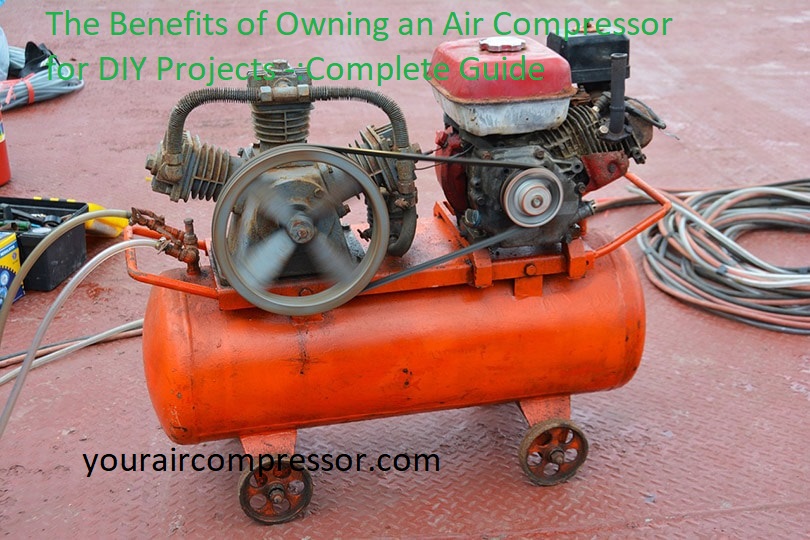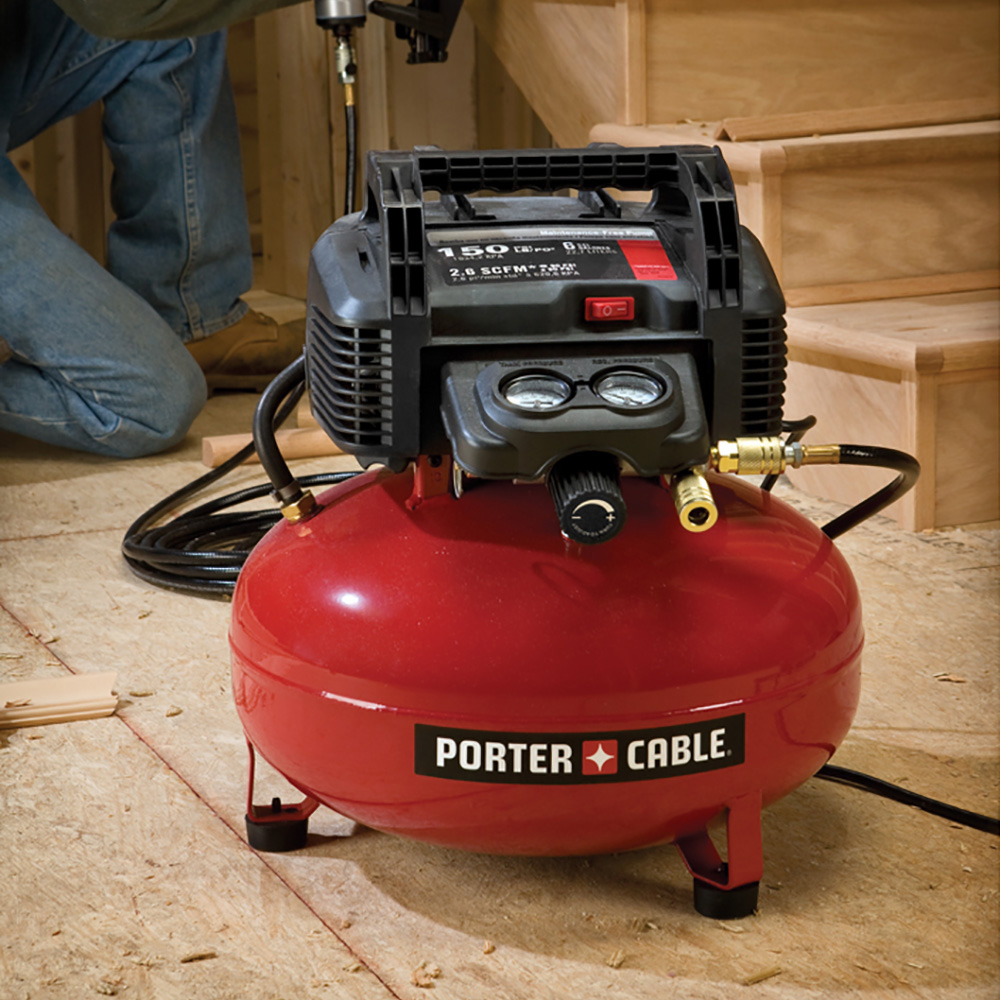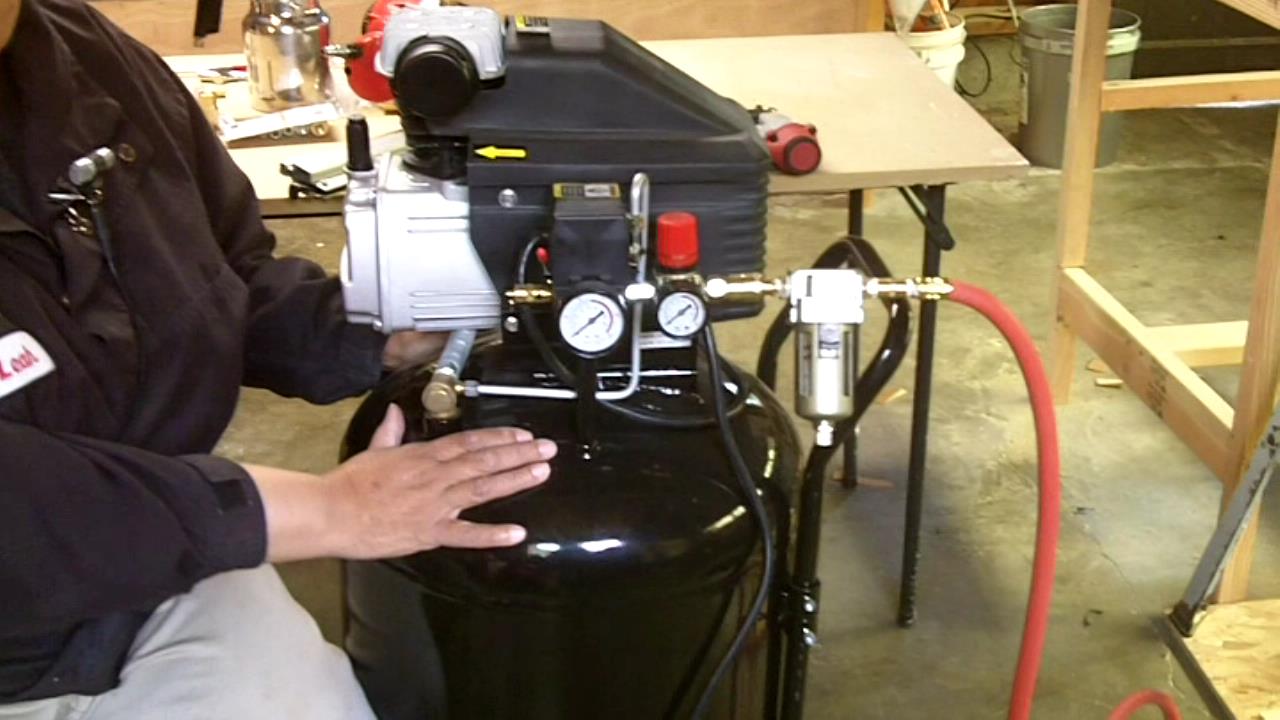 DIY projects can be daunting and tedious, but they don’t have to be. You can make your DIY project task simpler and easier with the help of an air compressor.
DIY projects can be daunting and tedious, but they don’t have to be. You can make your DIY project task simpler and easier with the help of an air compressor.
In this article, you’ll explore the many benefits of owning an air compressor for all your DIY projects.
An air compressor is an amazing tool that has many uses throughout the home and in industrial settings. It performs various tasks, from inflating tires and driving nails to cleaning surfaces and sanding wood. Air compressors are also used in industrial operations, including vacuum forming machines, soldering irons, paint sprayers, printing presses, and medical equipment.
This comprehensive guide will explore the many benefits of owning an air compressor to complete DIY projects around the home. With an air compressor at your disposal, you can tackle a variety of tasks with ease – from light work such as nailing down boards to tougher jobs like sanding surfaces – without having to hire an expert or purchase specialized tools.
In addition to DIY projects, this guide also covers the basics of understanding how a basic air compressor works and provides useful information about selecting the right compressor for your needs. It will outline the important features you should look for when purchasing a compressor and provide advice on how best care for it over time. Finally, this guide offers insight into some of the most common issues you may encounter with your air compressor as well as their solutions.
Explanation of what an air compressor is
An air compressor is a device that pressurizes and stores air in a tank. The pressure is then released and used to power pneumatic tools such as nail guns, caulk guns, paint sprayers, hammers and impact wrenches. It can also be used to inflate tires or objects such as balloons.
Air compressors vary in size and type, ranging from smaller portable models for small tasks to industrial grades for larger projects. Depending on the model chosen, an air compressor may also come with additional features such as an oil-free design, auto shutoff or ability to store various amounts of pressure for longer periods of time. Most often, the energy source is from electric motors or engines that use gasoline or diesel fuel.
Brief overview of the benefits of owning an air compressor
Owning an air compressor can be beneficial to people who enjoy doing DIY projects, as the powered device allows users to easily and quickly inflate tires, drive nails and screws into surfaces, blow away debris from surfaces or tools, etc. Air compressors work by compressing and storing air in a tank so that the stored energy can be released in a burst to power air tools – making them perfect for DIY projects.
Some benefits of owning an air compressor for your DIY projects include:
- Versatility: With an air compressor power source you can use a wide variety of tools for different tasks. This gives you the freedom to explore a variety of jobs with just one investment.
- Portability: An air compressor is smaller than most other power sources and this makes it easy to transport when needed. Thus it is extremely convenient when travelling around or carrying out tasks outside the home.
- Economical: Air compressors remain economical as they don’t require as much electricity as other devices do; by using stored energy, they consume less electricity and maintain great performance even after extended use.
- Safety: Having an air powered device eliminates any potential dangers that can arise while using electric devices. As the compressed air holds no electrons, there is virtually no risk electrocution with this kind of equipment.
Advantages of owning an air compressor
There are many advantages to owning an air compressor for DIY jobs around your home. An air compressor is a basic tool that can make your projects much easier and more efficient. The first major advantage is saving time and money. By having the ability to make quick, precise cuts or resizing wooden boards, you can avoid using manual tools that require more time. Additionally, you can adjust the pressure in your machine to allow for different tasks like inflating tires or cleaning surfaces with compressed air if appropriate.
In addition to saving time and money, owning an air compressor also ensures safety in certain tasks where danger could be more easily avoided with power tools rather than manual ones such as sawing logs or drilling into hard materials like metal. With its multiple uses, an air compressor is a great investment for any DIY enthusiast wanting to take their projects up a notch. Furthermore, it requires minimal maintenance compared to other power tools so it can be easily kept in good condition while being used anywhere from home to outdoorsy projects like sandblasting rust from old metal pieces or even cleaning glass tanks and pools.
Efficiency
An air compressor is a tool that can provide efficient, fast and convenient pressurized air for many DIY projects. Whether you’re working on your car, finishing cabinets, powering up pneumatic tools or more, an air compressor can help you complete many projects with greater speed than traditional hand tools. Air compressors are typically powered by electric electricity or gas, and vary in size from small hobby compressors to large industrial units. Here are some of the benefits of owning an air compressor:
- Increased Efficiency: The use of pressurized air produced by an air compressor makes it possible to complete tasks faster due to the power and speed of the compressed air flow. The increase in efficiency can save time and money when completing tasks around your home or workshop.
- Long-Term Durability: Air compressors’ motors are crafted for durability so that they last for many years without requiring frequent repairs or maintenance. A quality compressor will be able to power multiple tools at one time without damaging them or suffering from slow down from overuse which helps provide additional savings in both time and money.
- Versatility: Having an air compressor provides a variety of different uses – such as powering up pneumatic tools like nailers and paint sprayers – since the compressed air can be used for anything from light pressure sprays to heavy-duty pneumatic applications such as sandblasting. With its versatility it’s perfect for any job that requires compressed air – whether it’s done on a regular basis or only occasionally.
Versatility
One of the biggest benefits of owning an air compressor is its versatility. An air compressor can be used for a variety of DIY projects, from painting to sanding to tacking and nailing. From inflating pool toys or your car tires to powering shop tools like nail guns, air compressors have a wide range of uses.
You can also use them for pneumatics—moving or pushing objects with compressed air instead of electricity or water engines. This increases your power output significantly, as well as offering greater flexibility and portability.
Moreover, you can use an air compressor for powering pneumatic tools such as drills, lifts and wipers. Additionally, you can use one to run plumbing lines in hard-to-access areas where traditional methods would be more difficult and expensive than converting pneumatic energy into mechanical energy. And if you invest in add-on tools and accessories like hoses and couplers, you’ll be able to expand the number of tasks your air compressor can do exponentially.
Maintenance and care of an air compressor
Owning an air compressor comes with the responsibility of maintaining and caring for it. To ensure you get maximum benefit from your compressor and tools, follow these tips for continuous use:
- Regularly check the user manual for all maintenance instructions – The user manual is the best source to know all the maintenance requirements of your device.
- Change the oil regularly – Oil provides heat reduction and lubrication to parts of an air compressor, so it should be checked regularly as part of a maintenance schedule.
- Clean air filter/Foam filter element- Air filters should be checked regularly to remove dirt, dust or other particles which can cause damage to components if left unchecked. Foam filter elements should also be washed in mild soap and warm water on a regular basis.
- Check hoses regularly- All air hoses should be checked often for cuts, tears, abrasions or kinks that could reduce air flow or cause a system failure – especially if you’re using an older hose that may have been exposed to increased wear. Replace worn hoses as soon as possible to prevent further complications with your system.
- Clear debris before use – Proper safety precautions should always be taken before any tools are used with an air compressor including visual inspection of each component prior to operation and thoroughly cleaning any debris from the work area that may become lodged in the components such as motors and filters during use.
- Check pressure gauges- Pressure gauges are indicators of how much pressure a system is exerting at any given time – they should also be read back in comparison with what is recommended by manufacturer’s specifications during every use in order to ensure proper operation and performance levels.
Regular oil changes
Regular oil changes are an essential part of maintaining the performance of your air compressor. The oil in the compressor helps to keep the machine’s cylinder and valves lubricated, which helps to prevent wear and tear when air is pressurized.
It is important to keep the oil level in your air compressor between 30-40%, as too much or too little oil can cause damage to components. If your air compressor does not have an indicator on it for monitoring the oil level, you will need to get physical measurements from time to time.
Oil should be changed regularly according to manufacturer instructions, but at least every three months for normal maintenance and more frequently for intensive use.
Air filter replacement
One of the key elements of ensuring your air compressor works correctly and safely is maintaining air filters. Not only do air filters need to be regularly checked, but they also need to be replaced periodically. This helps make sure that your compressor isn’t taking in anything that could compromise the system, or put your personal safety at risk. Many compressors will come with standard filters, but for those DIY projects that require a higher level of cleanliness and performance, an upgrade may be warranted.
An upgraded filter can offer more filtration capacity, resulting in more efficient operation and less wear on the compressor motor. There are a few different types of air filter replacements you can purchase, depending on the type of projects you are doing:
- Particulate filters: These remove any solid particles from the incoming compressed air such as dirt or rust particles
- Activated carbon filters: remove any volatile organic compounds from the compressed air
- Oil/water separators: used typically for lubricated compressors to remove any condensation before it enters intake valve
- Oil removal filter: removes oil mist, created under high pressure while running most rotary screw compressors.
No matter which type or types of filter you choose, when replacing an existing filter or initially installing a new one it’s important to assess both the existing fitment and existing connections before opting for a universal replacement part. A good quality universal replacement should match exactly with all existing parts including size, port threading, flow rating and pressure rating.
Tips for using an air compressor for DIY projects

When using air tools and air compressors, it is important to use the right size compressor and the proper tools for any DIY project. Additionally, safety must be taken into consideration when working with an air compressor. When using an air compressor to power a tool, it is necessary to keep the following tips in mind:
- Make sure you are knowledgeable about the type of nozzle you will need for your project
• Choose an appropriate size pressure tank that meets the requirements of your project
• Verify that all attachments and hoses are securely fastened before operating your air compressor
• Wear protective gear such as gloves, eye protection, and hearing protection when operating your air compressor
• Insulate yourself from electricity by making sure that any exposed wiring or cords are properly grounded
• Place a well-sealed cover over the tank outlet valve to avoid pressure build-up within the tank during operation
• Keep children away from area where air tools are being operated.
Safety precautions
When using air powered tools, there are a few safety precautions to keep in mind. Always wear eye protection, since flying debris and metal shavings is a possibility and the force of the compressed air can even cause eye injury.
Be sure to use insulated gloves when handling metal parts as they will become cold due to the intense pressure. Furthermore, always keep any loose clothing or jewelry away from moving parts and never operate an air tool while it is not securely held in your hands.
To ensure proper functioning of the air compressor and tools, always check pressure levels and read operating manuals before use.
Choosing the right tools and accessories
When choosing an air compressor for your DIY projects, you will also need to make sure you have the right tools and accessories. While an air compressor can work with most pneumatic tools, some require special attachments or accessories to be effective.
These accessories usually include air couplings, cut-off valves, pressure regulators and gauge assembly kits. You should research the type of tool or accessory that you need to use before buying an air compressor so that it will have all the necessary components for your project.
You should also check for the types of hoses the compressor is compatible with and any adaptors that may be required if it has been modified from its original design. Additionally, check what type of filter and oil are recommended for your particular model so that it can perform correctly.
Conclusion

In conclusion, owning and operating an air compressor makes DIY projects around the home more efficient and can even help you save money in the long run. All of the benefits associated with air compressors – from portability, to affordability, to multitasking capabilities – make air compressors great additions to any tool collection.
For anyone looking for a reliable, handy piece of equipment to make their jobs around the house easier, investing in an air compressor is sure to be a sound decision.
FAQ’s
What are the benefits of owning an air compressor?
- Can power various pneumatic tools
- Saves time and effort in DIY and automotive tasks
- Provides consistent air supply for industrial processes
- Reduces the need for manual labor in tasks like painting and sanding
- Can be used for inflating tires, sports equipment, and inflatable toys
Why should I have an air compressor?
You should have an air compressor if you need a reliable source of compressed air to power pneumatic tools, inflate tires and sports equipment, or for industrial processes.
What are 3 advantages of compressed air?
- Provides a clean and dry source of power
- Can be stored in tanks for future use
- Is safe to use in hazardous environments
What is the main purpose of a compressor?
The main purpose of a compressor is to compress air or gas and increase its pressure, which can then be used for various purposes such as powering pneumatic tools or inflating objects.
What are 4 uses of air compressor?
- Powering pneumatic tools such as nail guns and impact wrenches
- Inflating tires, sports equipment, and inflatable toys
- Providing air supply for industrial processes such as spray painting and sandblasting
- Operating pneumatic controls in machinery and equipment
What is most important in an air compressor?
The most important factors in an air compressor are its performance, reliability, and efficiency, as well as its suitability for the intended application and the user’s needs.
What is the importance of air compressor in industry?
Air compressors are important in industry as they provide a reliable and consistent source of compressed air for a wide range of industrial processes, including powering pneumatic tools, controlling machinery, and operating pneumatic controls.
What are the 5 advantage of compressed air?
- Provides a clean and dry source of power
- Is safe to use in hazardous environments
- Can be stored in tanks for future use
- Allows for precise control of power output
- Can be used for a wide range of applications
What are two benefits of compressing?
Two benefits of compressing are that it allows for the storage of large volumes of gas in smaller spaces and increases the energy density of the compressed gas.
What are the 7 uses of compressed air?
- Powering pneumatic tools
- Inflating tires and sports equipment
- Supplying air to industrial processes
- Controlling machinery and equipment
- Operating pneumatic controls
- Cooling electronic equipment
- Cleaning surfaces with compressed air
see also…
- Best harbor freight air compressor2023
- Best Cordless Air Compressor 2023
- Best battery powered air compressor 2023
- Best airbrush air compressor 2023
- Best air compressor under 500 2023

